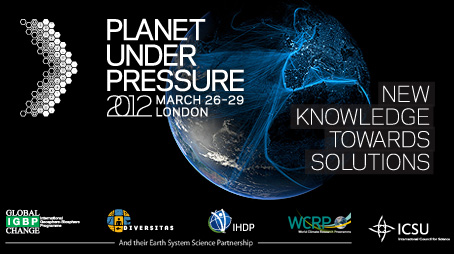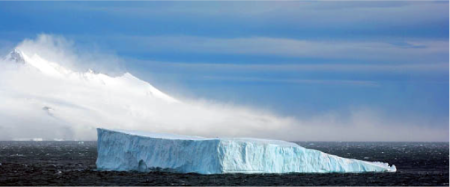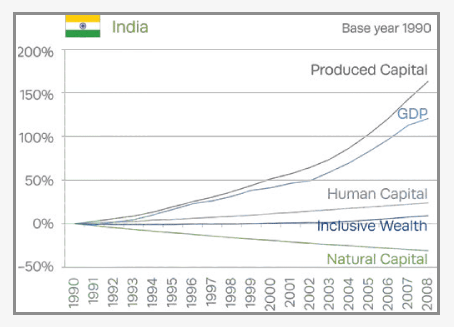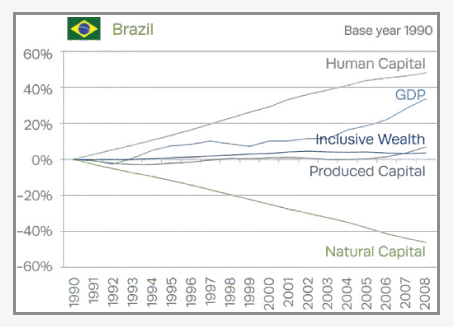| SEARCH |
-

Nov 17, 2015
Reflections on a three-decade legacy
The International Geosphere-Biosphere Programme (IGBP) will come to a close at t...
-
Nov 17, 2015
Use of and access to content on this website
Text and images produced by IGBP in house are free to use with appropriate credi...
-
Nov 12, 2015
Bella Gaia performance and panel discussion to mark IGBP's closure
A musical performance by Bella Gaia will celebrate the achievements and legacy o...
-

Towards Future Earth:
evolution or revolution?
During its three decades of existence, the International Geosphere-Biosphere Pro...
-
A personal note on IGBP and the social sciences
Humans are an integral component of the Earth system as conceptualised by IGBP. João Morais recalls key milestones in IGBP’s engagement with the social sciences and offers some words of advice for Future Earth.
-
IGBP and Earth observation:
a co-evolution
The iconic images of Earth beamed back by the earliest spacecraft helped to galvanise interest in our planet’s environment. The subsequent evolution and development of satellites for Earth observation has been intricately linked with that of IGBP and other global-change research programmes, write Jack Kaye and Cat Downy .
-
Deltas at risk
Around 500 million people worldwide live on deltas, but many of the world's deltas are sinking due ...
-
Climate change: the state of the science
A new data visualization released on the first day of the plenary negotiations at the UNFCCC’s clima...
-
Climate Change:
the State of the Science
Videos now online from the Stockholm public forum to mark the launch of the IPCC's climate report, 2...

Live audio stream of the news conference starting at 09:15 GMT (10:15 British Summer Time), Wednesday March 28: http://c3379912.workcast.net/planetunderpressure.html
Inclusive Wealth Report unveiled
Beyond GDP: Experts Preview “Inclusive Wealth” Indicator to Reflect Sustainability of Natural, Human as well as Manufactured Capital
Mr. Terry Collins
+1 416 878 8712
tc@tca.tc
Mr. Owen Gaffney
+46 8 673 9556
+46 73 020 8418
owen.gaffney@igbp.kva.se
Ms. Anne Kathrin Raab
+44 792 160 9742
+49 228 815 0616
raab@ihdp.unu.edu

Between 1990 and 2008, the wealth of these two countries as measured by GDP per capita rose 34% and 120% respectively. But a myopic focus on economic capital is flawed, scientists and economists at the conference argue. Natural capital, the sum of a country’s assets, from forests to fossil fuels and minerals, declined 46% in Brazil and 31% in India, according to a new “Inclusive Wealth Indicator” designed to augment GDP as a measure of economic progress.
When measures of natural, human and manufactured capital are considered together to obtain a more comprehensive value, Brazil’s “Inclusive Wealth” rose just 3% and India’s rose 9% over that time.
“The work on Brazil and India illustrates why Gross Domestic Product is inadequate and misleading as an index of economic progress from a long-term perspective,” says Professor Anantha Duraiappah, Executive Director of the United Nations University’s International Human Dimensions Programme (UNU-IHDP).
“A country could completely exhaust all its natural resources while posting positive GDP growth. We need an indicator that estimates the wealth of nations – natural, human and manufactured and ideally even the social and ecological constituents of human well-being.”
The first Inclusive Wealth Report, to debut in full at a joint UNU-IHDP and United Nations Environment Programme event at June’s UN “Rio+20” summit in Brazil, will describe the “inclusive wealth” of 20 nations: Australia, Brazil, Canada, Chile, China, Colombia, Ecuador, France, Germany, India, Japan, Kenya, Nigeria, Norway, the Russian Federation, Saudi Arabia, South Africa, USA, United Kingdom and Venezuela. The 20 nations featured in the report represent 72% of world GDP and 56% of global population.
Authored by 17 specialists from the UK, USA, Chile, Malaysia, India, Germany and Australia, the Inclusive Wealth Indicator is undertaken by UNU-IHDP with UNEP support and in collaboration with the UN-Water Decade Programme on Capacity Development (UNW-DPC) and the Natural Capital Project of Stanford University.
“Our goal is to provide national governments with a bi-annual report to assess transition to the so-called green economy, to create productive and sustainable economic bases for the future,” says Duraiappah.
Says Dr. Pablo Muñoz of UNU-IHDP, the report’s Scientific Director: “Until the yardsticks which society uses to evaluate progress are changed to capture elements of long-term sustainability, the planet and its people will continue to suffer under the weight of short-term growth policies.”
Yvo de Boer, former head of the UN Intergovernmental Panel on Climate Change and now Special Global Advisor to KPMG, has a similar message for businesses, calling on them to measure and report on sustainability in their corporate practices.
He notes a growing trend within commerce of companies “building frameworks for sustainability reporting processes, stronger information systems and appropriate governance and control mechanisms on a par with those currently used in financial reporting.”
Unprecedented natural resource scarcity, rising food prices, energy security issues and population growth of up to 10 billion by 2100, means “the private sector is ever more challenged to overhaul its strategy and make its business models future proof.”
“First and foremost,” he says, “businesses need to fully assess and understand future sustainability risks ... define their responses to deal with them, and analyze opportunities for efficiency, substitution or adaptation.”
At present, he notes, “if companies had to pay for the full environmental costs of their activities, they would have lost 41 cents out of every (US) $1 earned in 2010. The external environmental costs of 11 key industry sectors rose by almost 50 percent between 2002 and 2010, from $566 billion to $854 billion.”
“It is clearly no longer the question if we must transcend to a more sustainable economy. The question is the pace at which we are able, and especially willing, to achieve it.”
Meanwhile, leading experts in the issue call for fundamental reforms of global environmental governance and a "constitutional moment" comparable in scale and importance to the reform of international governance that followed World War II.
“Stark increases in natural disasters, food and water security problems and biodiversity loss are just part of the evidence that humanity may be crossing planetary boundaries and approaching dangerous tipping points,” says Professor Frank Biermann of VU University, Amsterdam, director of the Earth System Governance research alliance and IHDP’s Earth System Governance Project.
Among specific measures called for by Biermann and colleagues:
- Creation of a UN Sustainable Development Council to better integrate sustainable development concerns across the UN system, with a strong role for the world’s 20 largest economies (G20).
- Upgrading the UN Environment Programme to a full-fledged UN agency – a step that would give it greater authority, more secure funding, and facilitate the creation and enforcement of international regulations and standards.
- Stronger reliance on qualified majority-voting to speed decision-making in international negotiations;
- Increased financial support for poorer nations, including through novel financial mechanisms such as air transportation levies.
At the London conference, 3,000 experts spanning the spectrum of interconnected scientific interests, policymakers and business representatives are examining the planet’s vital signs, potential solutions, hurdles and ways to break down the barriers to progress. The conference is the largest gathering of experts in global sustainability in advance of “Rio+20” and the largest gathering ever of such a group of experts.
It concludes tomorrow with the presentation of the final conference statement.


The research discussed in the press release, the conclusions drawn and the opinions offered are those of individual speakers or research teams at the Planet Under Pressure conference.
How GDP compares to Inclusive Wealth – Preliminary Findings



The international science conference will be the biggest gathering of global environmental change specialists in advance of the United Nations Rio+20 Summit: 2,500 scientists, policymakers, industry and media representatives will meet to hear the latest research findings on the state of the planet and discuss concepts for planetary stewardship and societal and economic transformation towards global sustainability.
More information on the web:
www.planetunderpressure2012.net
Follow the conference via RSS:
www.planetunderpressure2012.net/xml/news.xml
Live web streaming, daily news show and live audio feeds:
http://c3379912.workcast.net/planetunderpressure.html

Planet under Pressure Conference Organizers
International Geosphere-Biosphere Programme
IGBP provides essential international scientific leadership and knowledge of the Earth system to help guide society onto a sustainable pathway during rapid global change.
www.igbp.net
DIVERSITAS
By linking biology, ecology and social sciences, DIVERSITAS produces socially relevant new knowledge to support sustainable use of biodiversity. www.diversitas-international.org
International Human Dimensions Programme on Global Environmental Change
IHDP provides international leadership in framing, developing and integrating social science research on global environmental change, and promotes key findings of this research to help address these challenges. www.ihdp.unu.edu
World Climate Research Programme
WCRP improves climate predictions and our understanding of human influence on climate through observations and modeling of the Earth system and the policy-relevant assessment of climate conditions. www.wcrp-climate.org
Earth System Science Partnership
ESSP is a partnership of the four international global change programmes. It is an initegrated study of the Earth System, the ways that it is changing, and the implications for global and regional sustainability. www.essp.org
Scientific sponsor of the conference:
International Council for Science.
ICSU is a non-governmental body with a global membership of national scientific bodies (120 Members, representing 140 countries) and International Scientific Unions (31 Members). Its mission is to strengthen international science for the benefit of society. www.icsu.org
IGBP closed at the end of 2015. This website is no longer updated.
-

Global Change Magazine No. 84
This final issue of the magazine takes stock of IGBP’s scientific and institutional accomplishments as well as its contributions to policy and capacity building. It features interviews of several past...
-

Global Change Magazine No. 83
This issue features a special section on carbon. You can read about peak greenhouse-gas emissions in China, the mitigation of black carbon emissions and the effect of the 2010-2011 La Niña event on gl...
-
INTERGOVERNMENTAL PANEL ON CLIMATE CHANGE:
How green is my future?
UN panel foresees big growth in renewable energy, but policies will dictate just how big.
-
UK:
'The Anthropocene: a new epoch of geological time?'
Royal Society, Philosphical Transactions A




















